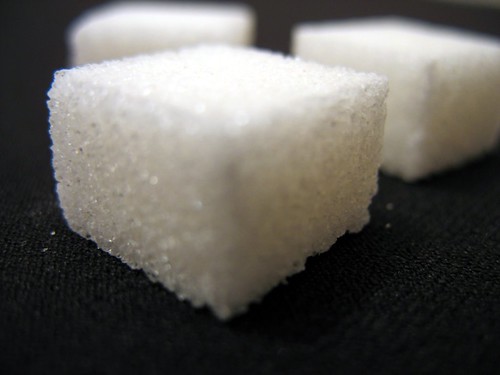Observe: common refined sugar.
 Now, when I say it's like crack, I'm not referring only to its alleged addictive properties (though it is a convenient parallel); mostly I was thinking of the fact that the street drug and the sweetener share an uncanny resemblance
Now, when I say it's like crack, I'm not referring only to its alleged addictive properties (though it is a convenient parallel); mostly I was thinking of the fact that the street drug and the sweetener share an uncanny resemblance as white, powdery substances, and the unfortunate truth that both provide a happy little "fix" while ultimately serving as a detriment to your health.
as white, powdery substances, and the unfortunate truth that both provide a happy little "fix" while ultimately serving as a detriment to your health. Crack, of course, is an illegal narcotic, but while sugar is getting some bad press lately, it remains deeply entrenched in our culture. Consider the phrase, "American as apple pie," for example. What makes an apple pie? A good crust, fruit, and lots of sugar. The stuff is all over the place in our traditions, our artistic expressions, and our everyday life.
Now, before this turns into an anti-sugar essay, let me say that sugar represents a common trend in America and in my own life, where we pursue things simply because they taste so good. We even, from time to time, try to convince ourselves that it's healthy. But we only try to do that because we know it's not. Meanwhile, our society is so wrapped up in a hedonistic paradigm that turning away just seems weird.
Enter Dr. Jerry Sittser. I had the opportunity to hear Jerry speak briefly yesterday, and he reminded me of a phenomenon that I hadn't thought about in awhile. Back in the day, (we're talking fourth century A.D., not the 1980's) droves of people ditched civilization completely and went to live in Middle Eastern deserts, where they battled demons, ate dates, and sat on pillars in isolation, all ostensibly with the goal of seeking God. I've always been a little skeptical of the "desert fathers" myself, but I think we can learn a lot from them about the value of discipline.
Asceticism was highly regarded in that time and region as a means to escape corrupt culture and foster spirituality; it seems strange to us, what those people were doing, and accordingly we as the church in America have largely turned our backs on the materially spare lifestyle they modeled. We don't even really use the term "asceticism" anymore, at least not for normal people. It's more the domain of hairless vegetarian Tibetans and extreme protesters.
This all might be another symptom of the somewhat misguided quest for cultural relevance, but it might also be due to our own purchase of the line everyone is trying to sell us--you should try to "get yours" (it's the American dream! The American way!) as long as you don't, you know, go overboard with it (everything in moderation!). We're blessed and God wants us to be happy, so the only limit to our excess is our own ability to justify it.
At this point I've written well past my intended stopping point, but suffice it to say that my life is probably built around the pursuit of superficial gratification more than I realize, and it's probably doing me less good than I think (and I suspect that I am not alone in this).
As a friend of mine once said, "I had a hatchet in one hand, and a drink in the other; it really was all about pleasure." It's an apt metaphor, I think; it's just what we do, and unfortunately it's hard to work for God when your hands are so occupied.
2 comments:
Jerry Sittser was perhaps my favorite professor at Whitworth. Glad you got to him him speak. He is an inpiring man.
:-)
Yeah, I could listen to him for hours. Someone should make podcasts of his History of Christianity lectures...
Post a Comment